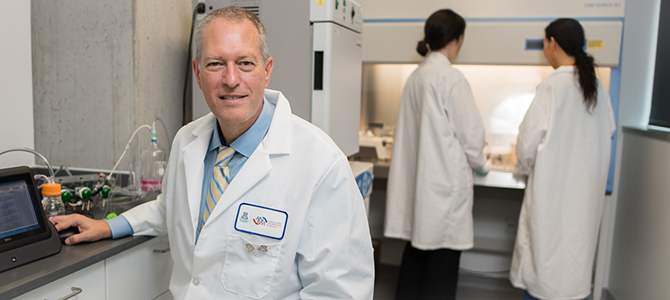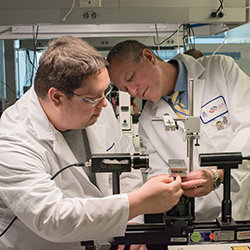
College to Develop Radiation Test for Astronauts

They may not be launching a Tesla into space, but scientists at the University of Arizona College of Medicine – Phoenix are developing devices that will improve the medical care of astronauts.
The Center for Applied NanoBioscience and Medicine was recently awarded a $32,000 pilot grant as part of the Synergy Program of the Translational Research Institute for Space Health, also known as TRISH, by NASA and Baylor College of Medicine. The award is designed to promote disruptive technology that can be ready for inflight use within a year.
“We are putting the College of Medicine – Phoenix at the forefront of health performance research in space,” said Frederic Zenhausern, PhD, MBA, professor and director of the Center for Applied NanoBioscience and Medicine. “The complementary Synergy award will allow us to bridge technology gaps and exchange resources between the teams of the TRISH consortium to accelerate the implementation of health technology platforms that can be translated into inflight solutions.”

The platform will expand the range of biomarker detection from proteins to genes in bodily fluids. With this technology, astronauts will be able to use inflight diagnostics to assess how much radiation they have been exposed to in space. It also will allow astronauts to monitor their cognitive performance of critical tasks during deep space exploration.
Radiation is the biggest worry for an astronaut, Dr. Zenhausern said.
“The goal is to target technologies that have value and the necessary maturity level to qualify for space flight,” Dr. Zenhausern said. “Space medicine is becoming a major issue. It’s not only about the science, but we need to understand how to translate these technologies for space application, as NASA plans to return to the Moon as early as 2020, and future journeys to Mars in the 2030s.”
The Vertical Flow Paper-based Platform will be built within a miniaturized syringe-like cartridge that will detect bio-agents and hundreds of biomarkers in small or large volumes of bodily fluids.
Dr. Zenhausern hopes the technology will not only be used for space, but also on Earth as a fast, mobile, simple test that will ultimately be used by consumers and health institutions.
About the College
Founded in 2007, the University of Arizona College of Medicine – Phoenix inspires and trains exemplary physicians, scientists and leaders to advance its core missions in education, research, clinical care and service to communities across Arizona. The college’s strength lies in our collaborations and partnerships with clinical affiliates, community organizations and industry sponsors. With our primary affiliate, Banner Health, we are recognized as the premier academic medical center in Phoenix. As an anchor institution of the Phoenix Bioscience Core, the college is home to signature research programs in neurosciences, cardiopulmonary diseases, immunology, informatics and metabolism. These focus areas uniquely position us to drive biomedical research and bolster economic development in the region.
As an urban institution with strong roots in rural and tribal health, the college has graduated more than 1,000 physicians and matriculates 130 students each year. Greater than 60% of matriculating students are from Arizona and many continue training at our GME sponsored residency programs, ultimately pursuing local academic and community-based opportunities. While our traditional four-year program continues to thrive, we will launch our recently approved accelerated three-year medical student curriculum with exclusive focus on primary care. This program is designed to further enhance workforce retention needs across Arizona.
The college has embarked on our strategic plan for 2025 to 2030. Learn more.